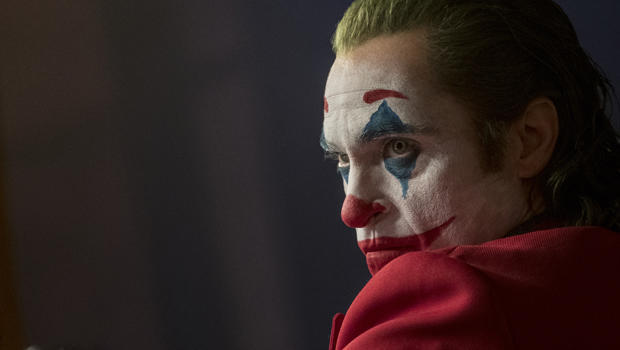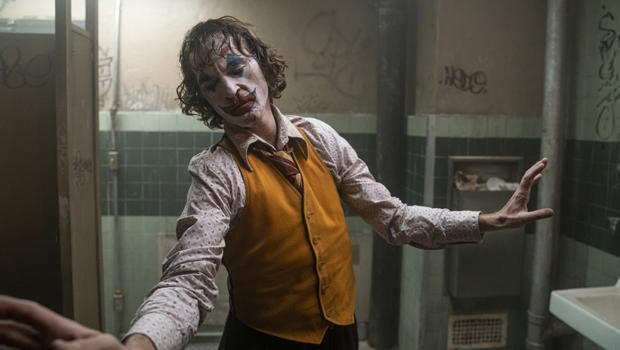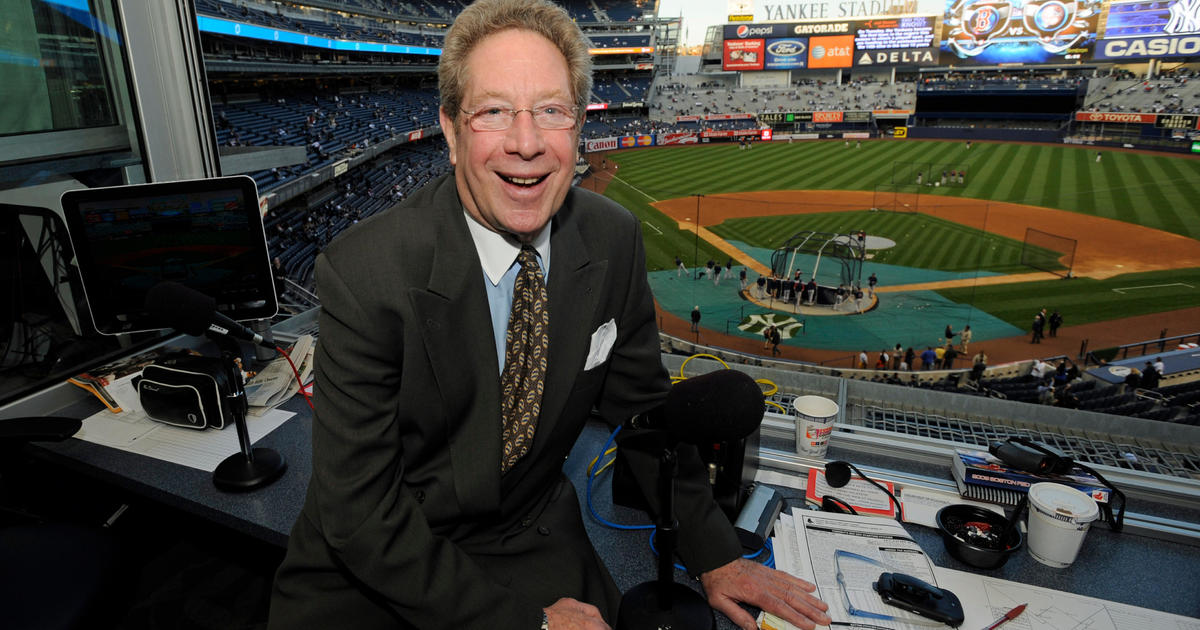Review: Joaquin Phoenix as "Joker," the anti-anti-hero
Joker, who became Gotham's most infamous criminal mastermind and the most diabolical of Batman's nemeses, had to start somewhere. And that somewhere was in a dingy apartment with a mentally unstable mother, working a doleful job as a clown, and aspiring to become a standup comedian. He meets with an unhelpful social worker, takes seven prescription meds, and is plagued by "negative thoughts." Welcome to a different DC Comics universe.
The origin story "Joker" (which had its N.Y.C. premiere Wednesday at the New York Film Festival, and opens in theaters Friday) is a detour away from the flash and action of Batman films and towards a somber character study of how a damaged soul can rebuild itself in an even more damaged fashion. The film won top prize at the Venice Film Festival earlier this year, probably as much for what it wasn't (superheroes clashing with evil-doers) as for what it was.
Arthur Fleck (Joaquin Phoenix) is our entryway into a circa-1981 Gotham in which social services are falling apart, crime is rampant, and the general populace is struggling to get by. Abused as a child and suffering from a neurological condition that sets him off on maniacal laughing fits for no reason, Fleck only wants and needs, it seems, audience approval, which is in short supply when he tries out his act at a comedy club (reading from a notebook is never a good tactic on stage), or when a videotape of his fitful performance becomes fodder for a humiliating monologue by a late-night TV talk show host, Murray Franklin (Robert De Niro).
Director Todd Phillips and his co-screenwriter Scott Silver have taken as their inspiration gritty '70s dramas by the likes of Sidney Lumet and Martin Scorsese, whose urban parables of crime and corruption elevated characters like Al Pacino's Sonny in "Dog Day Afternoon" and Robert De Niro's Travis Bickle in "Taxi Driver" to mythic status. Their anti-heroes, who railed against a broken system or societal defects, rallied audiences despite their crimes (bank robbery, vigilantism). They sought to make themselves larger in a world where they felt otherwise crushed. (Sonny's "Attica! Attica!" chant may have been an opportunistic ploy at playing to the crowd and against the police, but it touched a raw nerve, and transformed his botched bank robbery into a cause célèbre and a media sensation.)
Phoenix's Arthur Fleck similarly feels crushed by a society in which violence and nihilism reign. But unlike those '70s anti-heroes, Fleck isn't attracted to defeating forces of violence and nihilism. He even ignores an opportunity to come to a young woman's aid when she is harassed by jerks on a train, but when their attention turns to him, suddenly his will to lash out has no limits. He becomes, like Batman, a vigilante.
This R-rated comic book-inspired film is not for kids, who would likely be bored anyway given the lack of superhero histrionics. It is a dark and pessimistic character study about an unfortunate soul who craves applause, and doesn't mind if it comes from a mob who are willing to burn Gotham down. He becomes an anti-anti-hero.
That doesn't mean this "Joker" isn't to be recommended. Phoenix maintains his position as one of the very best actors around, and he brings an effective pain and dislocation to his performance. Especially powerful is a scene following his first murders, in which he "dances" to music only he, apparently, can hear. His madness may explain his violence, but there is just enough illogic behind his targets to make you less sympathetic to his "negative thoughts." We feel for Fleck's social discomfort, but his underwritten relationship with a pretty neighbor (Zazie Beetz) doesn't give us much hope that he can turn that around.
And there are obvious comparisons to Heath Ledger's magnificent performance as Joker in Christopher Nolan's "The Dark Knight," which was an entirely different kettle of fish — his adversarial dynamics against Gotham crime bosses, the police, and Batman himself always put him in the driver's seat, and his anarchist views were entirely aligned with his actions. He acted rather than reacted.
Phoenix's Fleck, on the other hand, struggles to be in the driver's seat. The notoriety of his crimes inspires an Occupy Wall Street-esque movement against the elite, with demonstrators protesting and rioting while wearing clown masks and costumes — a modest nod to Joker's tabloid infamy. But the mob is an animal that is never on Joker's leash or working at his behest. It's truly anarchic, and Arthur Fleck is as much a spectator as its public face.
His one opportunity to actually put a voice behind the police sketch emblazoned on the newspaper's front pages is characterized as self-pity, rather than political activism. And it's true: Fleck wouldn't make it as a stand-up comic, and with his career options pretty limited, he is a sad figure. Pointing a gun at someone's head doesn't make him less sad.
Phillips, who made his name in comedy (as director of the "Hangover" series, and co-writer of "Borat: Cultural Learnings of America for Make Benefit Glorious Nation of Kazakhstan"), does inject some humor here and there, sometimes when the film is at its most bleak, but he's not intent on putting a smile on his audience's face. Just the opposite: We see in this dying city a lost soul, and the terror that he leaves in his wake while he tries to find it.
We also see in this origin story the origins of Batman, and the rather obscure connection that Fleck may have with the young Bruce Wayne, a child who, we know, will witness the murder of his parents. The rest is history.
The film's exceptional technical credits include Lawrence Sher's cinematography, Mark Friedberg's production design, and an arresting score by composer Hildur Guðnadóttir (TV's "Chernobyl," "Sicario: Day of the Soldado").
"Joker" opens in theaters nationwide on Friday. Rated R, for strong bloody violence, disturbing behavior (well, yeah…), language and brief sexual images. 122 mins.
To watch a trailer for "Joker" click on the video player below:





